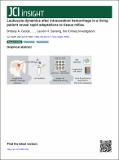Leukocyte dynamics after intracerebral hemorrhage in a living patient reveal rapid adaptations to tissue milieu
Author(s)
Goods, Brittany A; Askenase, Michael H; Markarian, Erica; Beatty, Hannah E; Drake, Riley S; Fleming, Ira; DeLong, Jonathan H; Philip, Naomi H; Matouk, Charles C; Awad, Issam A; Zuccarello, Mario; Hanley, Daniel F; Love, J Christopher; Shalek, Alex K; Sansing, Lauren H; ... Show more Show less
DownloadPublished version (1.769Mb)
Publisher with Creative Commons License
Publisher with Creative Commons License
Creative Commons Attribution
Terms of use
Metadata
Show full item recordAbstract
Intracerebral hemorrhage (ICH) is a devastating form of stroke with a high mortality rate and few treatment options. Discovery of therapeutic interventions has been slow given the challenges associated with studying acute injury in the human brain. Inflammation induced by exposure of brain tissue to blood appears to be a major part of brain tissue injury. Here, we longitudinally profiled blood and cerebral hematoma effluent from a patient enrolled in the Minimally Invasive Surgery with Thrombolysis in Intracerebral Hemorrhage Evacuation trial, offering a rare window into the local and systemic immune responses to acute brain injury. Using single-cell RNA-Seq (scRNA-Seq), this is the first report to our knowledge that characterized the local cellular response during ICH in the brain of a living patient at single-cell resolution. Our analysis revealed shifts in the activation states of myeloid and T cells in the brain over time, suggesting that leukocyte responses are dynamically reshaped by the hematoma microenvironment. Interestingly, the patient had an asymptomatic rebleed that our transcriptional data indicated occurred prior to detection by CT scan. This case highlights the rapid immune dynamics in the brain after ICH and suggests that sensitive methods such as scRNA-Seq would enable greater understanding of complex intracerebral events.
Date issued
2021Department
Massachusetts Institute of Technology. Department of Chemistry; Massachusetts Institute of Technology. Institute for Medical Engineering & Science; Koch Institute for Integrative Cancer Research at MIT; Massachusetts Institute of Technology. Department of Chemical Engineering; Ragon Institute of MGH, MIT and Harvard; Massachusetts Institute of Technology. Computational and Systems Biology ProgramJournal
JCI Insight
Publisher
American Society for Clinical Investigation
